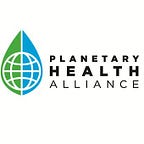Welcome, New Alliance Members!
In April 2024, we are welcoming 8 new members to the Alliance. Please read more about them below.
Institute for Planetary Health Behaviour at Universität Erfurt recognizes that Planetary Health is decisively shaped by human behavior. They believe that policy action should therefore be based on insights on how behavior can be changed on individual and system levels to improve Planetary Health. The Institute for Planetary Health Behaviour plans to contribute by adding a behavioral science perspective to the Planetary Health Alliance. They believe this can help to base societal discourse and policy making on a thorough understanding of how people actually behave and which levers increase individual and collective readiness to act against climate change.
Karolinska Institutet (KI) promotes Planetary Health both in education and research. Their university take active part in the work of the Planetary Health Europe Regional Hub and have been part in the e-Planet project financed by the aim to equip health professionals with the knowledge and skills they need to promote and deliver sustainable health care and achieve attitude change. With an online serious digital game, they want to assist higher education institutions in addressing an unmet need and accelerate the implementation of Planetary Health in the medical curricula.
The Institute of Public Health (IPH) of the United Arab Emirates University (UAEU) has a mission to enhance the health and well-being of the population through excellence in public health education, research, community service, and evidence translation into better health policies and practices to prevent diseases, strengthen the health systems and promote the health of the UAE and the global population. Sustainability is one of the core principles of the UAEU and IPH is committed to contributing to an environmentally sustainable medical and public health practice based on principles of Planetary Health in collaboration with other members of the Planetary Health Alliance.
Amplify Health and Development in Africa (AHDA) is a nongovernmental organization registered and based in Tanzania to build healthy communities through advocacy, storytelling, community action and communications for change. Their major areas of focus areas are climate change and health, community engagement and health systems strengthening.
Medical Society Consortium on Climate and Health seeks to merges efforts to promote health, equity, and environmental sustainability. By combining the expertise and networks of the Medical Society on Climate and Health with the transdisciplinary approach of the Planetary Health Alliance, they aim to enhance their impact on addressing climate change challenges. Together, they hope to empower diverse communities, advocate for health and equity-focused policies, and promote widespread action for a sustainable future. Through collaboration, they strive to prioritize health and equity in the global discourse on climate change, paving the way for a resilient and equitable world.
The Association of Science and Technology Centers (ASTC) is a non-profit membership association based in North America that has supported the global science engagement field since 1973. One strategic initiative is Seeding Action, which supports and catalyzes science centers, museums, and other public engagement networks to cultivate a culture of hope and action for Planetary Health. To achieve this, they support relationships between professionals and organizations working to engage their communities on Planetary Health topics; undertake efforts to build capacity for increased Planetary Health public engagement; and conduct research on public mindsets about Planetary Health action and promising approaches to sparking more widespread participation in solutions. They are eager to collaborate on content co-creation that could be shared with science centers and museums, training and other capacity-building efforts to help professionals effectively engage their communities in solutions, and research to understand public mindsets and effective communication and engagement approaches.
United for Global Mental Health is an international NGO working on mental health policy and advocacy across the world at the global and national levels. One of their areas of work focuses on the intersection of climate change, pollution, and biodiversity loss with mental health. They are excited to be joining the Planetary Health Alliance to call for health (both physical and mental) to be integrated across actions to respond to the planetary crisis.
